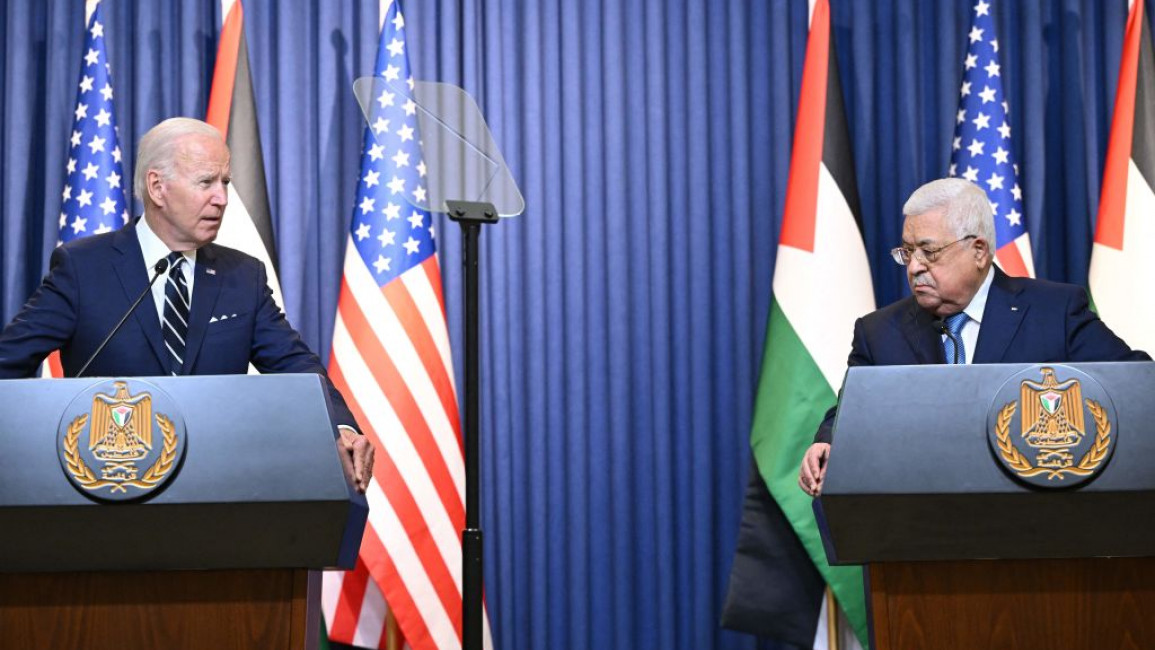
Mahmoud Abbas: A legacy of empty threats
Prior to Joe Biden's visit to the Middle East, Mahmoud Abbas and his aides made strong statements and issued threats that if Biden's visit doesn't bring about any major change in his policies towards the Palestinians, the Palestinian leadership will have to take 'difficult' actions.
They alluded to implementing decisions made by the PLO's central council which were taken back in 2015, such as ending all bilateral agreements and security coordination, as well as suspending recognition of Israel.
In his recent visit to the region, Biden didn’t confront Israel on any of the dangerous violations of Palestinian rights that took place since he took office: the spike in home demolitions, the escalation of settlements expansion in the West Bank and in and around Jerusalem, the rise in daily violence against the Palestinians, the murder of Shireen Abu Akleh, and the violations of the status quo in Al-Aqsa compound for the first time in decades.
His visit, however, has focused solely on further cuddling Israel, boosting its security, and advancing its 'integration in the region.'
''Abbas who’s now in his 17th year in office, is still running around in circles, unwilling to take any new and brave decisions. This lack of action has been greatly beneficial to Israel and incredibly destructive to the Palestinian struggle.''
Furthermore, Biden didn't fulfil any of the urgent demands regarding reversing Trump’s measures which include reopening the US consulate in Jerusalem, reopening the PLO's office in Washington, and removing the PLO off the US congress terror blacklist.
Biden, in a stark, but expected, difference to his two-day visit to Israel, visited the Palestinians for two hours.
But despite how incredibly disappointing Biden's visit was for the Palestinians, it doesn’t seem that there’s going to be any follow through on the PA’s threats either, two weeks later.
This has been the trend for years now, Abbas and his aides issue threats and don’t fulfil them.
Ever since he assumed office in 2005, Abbas has effectively adopted a policy of unwavering commitment to the US-sponsored bilateral agreements with Israel, as well as an ardent commitment to appease the US and Israel in a lot of their demands. Abbas probably thought that this approach would earn him the trust of being a 'peace partner' and will maximise the chances of the Palestinian state coming into existence.
His policies, however, turned out to be a disaster for the Palestinians as they delivered them nothing good, and Israel used Abbas' policies and passivity to entrench the occupation in the West Bank and East Jerusalem to a seemingly irreversible point.
Due to Abbas’ acquiescence policies, the PA has become a de facto subcontractor to the Israeli occupation. Israel has used the PA as a tool to carry for it the financial cost and policing of the occupation.
But despite all of this, Abbas who’s now in his 17th year in office, is still running around in circles, unwilling to take any new and brave decisions. This lack of action has been greatly beneficial to Israel and incredibly destructive to the Palestinian struggle.
However, the situation is not sustainable.
In the face of zealous US support and Israel’s relentless commitment to entrenching their occupation and dismantling any chance for freedom, Abbas, and his aides, must act immediately to re-form a strong Palestinian struggle that can finally deliver on the Palestinian aspirations for self-determination.
This must begin with moving towards intra-Palestinian unity.
The issue of division has to be resolved, and it’s not just the Hamas-Fatah split – even though it’s right at the centre of it. Abbas, unfortunately, tore apart the PLO factions like Fatah, the Popular Front for the Liberation of Palestine, and Democratic Front for the Liberation of Palestine, who had for decades prior to his ascension to power, worked collectively to advance the Palestinian struggle.
Indeed, during Yasser Arafat’s leadership, despite major disagreements, all of the factions joined efforts as one unit under the umbrella of the PLO.
Abbas also scattered and splintered Fatah itself. Numerous senior officials who demanded change in policies had been side-lined and ostracised.
There’s also a huge schism between the PA’s leadership and the population. Some PA leaders and ministers, many appointed by Abbas, are viewed largely as elites who are totally disconnected from the people.
These kinds of splits amongst the Palestinians are extremely deflating in the context of the struggle for freedom.
The second step in reversing the current course, is revitalising the PLO and PA with the inclusion of younger people. There are thousands of well-educated young Palestinians who have a number of creative and powerful ideas to reinvigorate the liberation movement and who are waiting for a chance to be heard.
A culture of inclusivity and democratisation of the institutions that exist, is key.
A third important step would be to activate popular nonviolent resistance against Israel. The PA has used it for years but merely as a slogan in its rhetoric, it has never implemented it, mobilised for it, or encouraged such action.
Popular non-violent resistance has, in the past, been successful when it was implemented in the occupied Palestinian territories. If in future such mobilisation receives backing from the Palestinian leaderships, it has the potential to deliver significant changes.
Abbas’ rule has been hallmarked by passivity and inaction, and such an approach cannot be allowed to continue. Whilst leading an occupied nation is certainly no small task, anyone who takes it on must be a constant proactive force – ready to take brave, collective, decisions, and to adjust its policies according to the results. The Palestinian leadership should also be inclusive and democratic, enriching and empowering to the nation’s political parties as well as its population.
Any individual incapable of all of this, has no place in power.
Ahmed Zed is a journalist and researcher whose work focuses on issues linked to the Israeli-Palestinian conflict.
Have questions or comments? Email us at: editorial-english@alaraby.co.uk
Opinions expressed in this article remain those of the author, and do not necessarily represent those of The New Arab, its editorial board or staff.




